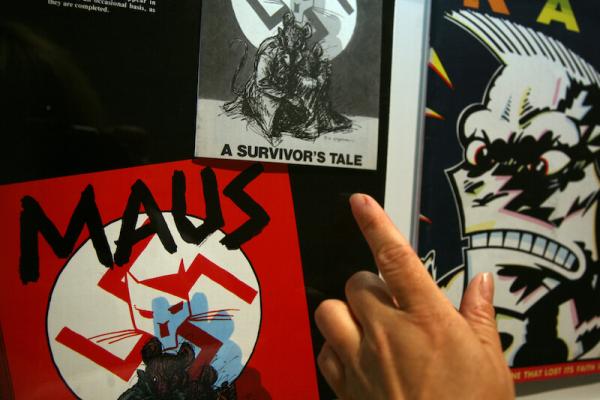When Tennessee’s McMinn County School Board unanimously voted to remove the graphic novel Maus from its eighth-grade curriculum, there was a widespread outcry. Maus is a graphic novel written by Jewish cartoonist Art Spiegelman. The book illustrates the horrors of the Holocaust as dictated to him by his father, a Jewish Holocaust survivor who was imprisoned at the Nazi death camp, Auschwitz.
In Maus, Jews are drawn as anthropomorphic mice, while Nazis are portrayed as cats. The book chronicles the Spiegelman family’s attempts to hide from the Nazis, showing the harshness of life in the ghetto, the desperation of parents attempting to protect their children, and the Nazi's cruel treatment of Jews in concentration camps. It even addresses the lingering impacts of the generational trauma of the Holocaust on the Spiegelman family in a way that can only be expressed by someone who experienced it firsthand. The story it tells is dark and disturbing, but the story of Spiegelman’s father and the story of the Holocaust requires such a telling.
Smart-MAUS2

According to the McMinn County School Board, the book was not banned because of its portrayal of the Holocaust. The school board insisted that its decision to remove Maus from its eighth-grade curriculum was not based on antisemitism but based on eight curse words and images of nudity. Regardless of the school board’s reasoning, people across the country voiced strong disapproval of banning a book about the Holocaust.
In an attempt to combat accusations of antisemitism, the school board said that it didn’t have an issue with students reading a Holocaust book so long as it was not this Holocaust book. As the school board wrote in the official statement on their website, “We simply do not believe that this work is an appropriate text for our students to study.”
But the school board will have a very hard time finding a book that covers the Holocaust as honestly as Maus while fitting its definition of “appropriate.” What sets Maus apart from other books about the Holocaust is the lack of sanitization in its portrayal of the Holocaust’s horrors. Ultimately, the school board made this decision because their squeamishness about certain words and images is more important to them than showing solidarity with Jews. The school board may say it is because of inappropriate content but functionally, this decision was made to prioritize the comfort of the dominant, non-Jewish culture above all else.
This decision allows the school board to ignore the dark and disturbing truth of the Holocaust and it steals from students the opportunity to learn from Jewish Holocaust victims and survivors.
Authors Gwen C. Katz and A.R. Vishny have written about this trend as the “pajamafication” of the Holocaust which is a reference to the heavily criticized Holocaust novel written by John Boyne, The Boy in the Striped Pajamas. Pajamafication, according to Katz and Vishny, prioritizes feel-good, often fictional Holocaust stories centered around non-Jews rather than focusing on the more jarring accounts of Jewish victims and survivors.
As several Twitter users pointed out shortly following the Maus ban, many of the most popular books about the Holocaust feature Gentile protagonists who, in many cases, play a “savior” role to the Jewish characters. This is in stark contrast to Maus which is centered around Jewish experiences and characters.
To be clear, there were Gentiles who protected Jews during the Holocaust, often risking their own lives to do so. Israel’s official memorial to the victims of the Holocaust, Yad Vashem, honors those who did so as “The Righteous Among the Nations.” Their stories are important and can provide a valuable lesson in what true solidarity looks like. However, there is a huge difference between recognizing the heroic actions of an extremely small minority who chose solidarity and painting a more comfortable, less honest image of the Holocaust at the expense of Jewish voices. That is why the school board’s stated intention to “find other works that accomplish the same educational goals in a more age-appropriate fashion” is not enough.
True solidarity requires a rejection of the comfort that sanitized stories offer. Learning about the Holocaust from the perspective of those who were most personally and directly harmed by it opens the door to greater empathy and understanding in a way that more “appropriate” stories cannot.
From a Christian perspective, choosing stories that make us feel comfortable over stories that tell the whole truth is antithetical to the gospel that Jesus — who was himself Jewish — taught. Throughout his ministry, Jesus centered those at the margins and emphasized the need to honor the image of God in everyone. Paul picks up on this message in Romans and urges followers of Jesus to “weep with those who weep” (Romans 12:15). But rather than weeping with Jews over the history of the Holocaust, some Christians have come out in support of banning Maus because the book contains language they find offensive. Prioritizing comfortable language over genuine solidarity illustrates a serious disconnect from the values of our faith.
As a Jewish believer in Jesus, I have also noticed tendencies among many Gentile Christians to speak for Jews. Rather than centering Jewish stories and beliefs in an attempt to stand in solidarity with the Jewish community, Christians prioritize their own comfort. This is especially grave because of the increase in antisemitic attacks happening throughout the United States.
If Christians want to love their Jewish neighbors, then they must be willing to listen to the whole story and not just the parts that are easy to hear; weeping with those who weep requires decentering yourself and putting the voices of the oppressed first, regardless of how comfortable or uncomfortable hearing those stories may be.
Maus is not meant to be a comfortable or “appropriate” story about the Holocaust. This is because it was written by a Jewish author about his own family’s experiences under the Nazi regime. The school board may say they are attempting to protect kids from inappropriate content but in reality, they are allowing antisemitism to fester by preventing non-Jewish kids from understanding the whole truth of the Holocaust and empathizing on a deeper level with the Jews in their lives.
Maus invites non-Jewish readers to see the horrors of the Holocaust and sit with the discomfort of the truth about antisemitic violence. This is what makes it powerful. Therefore, banning Maus is not just about condemning this one specific book. Banning Maus is ultimately about choosing the comfort of the dominant culture over the voices of those who were most directly impacted by Nazi atrocities. This is why choosing another, “more appropriate” book misses the point. The point is to decenter the comfort of the dominant culture and recenter those who are hurting and weeping. It is only through reading books like Maus that non-Jews can truly stand with and love their Jewish neighbors in light of the whole, uncomfortable truth.
Got something to say about what you're reading? We value your feedback!






